
Rush Hour is a 1998 American buddy action comedy film directed by Brett Ratner and written by Jim Kouf and Ross LaManna from a story by LaManna. It stars Jackie Chan and Chris Tucker as mismatched police officers who are assigned to rescue a Chinese diplomat's abducted daughter. Tzi Ma, Tom Wilkinson, Ken Leung, Mark Rolston, Elizabeth Peña, and Rex Linn play supporting roles. Released on September 18, 1998, the film grossed over $244 million worldwide. Its box office commercial success led to two sequels: Rush Hour 2 (2001) and Rush Hour 3 (2007).

The Corruptor is a 1999 American action thriller film directed by James Foley, written by Robert Pucci, and starring Chow Yun-fat and Mark Wahlberg. The film was released in the United States on March 12, 1999.

Ransom is a 1996 American action thriller film directed by Ron Howard from a screenplay by Richard Price and Alexander Ignon. The film stars Mel Gibson, Rene Russo, Gary Sinise, Delroy Lindo, Lili Taylor, Brawley Nolte, Liev Schreiber, Donnie Wahlberg and Evan Handler. Gibson was nominated for a Golden Globe Award for Best Actor. The film was the 5th highest-grossing film of 1996 in the United States. The original story came from a 1954 episode of The United States Steel Hour titled "Fearful Decision". In 1956, it was adapted by Cyril Hume and Richard Maibaum into the feature film, Ransom!, starring Glenn Ford, Donna Reed, and Leslie Nielsen.

Chain Reaction is a 1996 American science fiction action thriller film directed by Andrew Davis, starring Keanu Reeves, Morgan Freeman, Rachel Weisz, Fred Ward, Kevin Dunn and Brian Cox. The plot centers on the invention of a new non-contaminating power source based on hydrogen and the attempts by the United States Government to prevent the spreading of this technology to other countries. The film was released in the United States on August 2, 1996.
Golden Venture was a 147-foot-long (45 m) cargo ship that smuggled 286 undocumented immigrants from China along with 13 crew members that ran aground on the beach at Fort Tilden on the Rockaway peninsula of Queens, New York on June 6, 1993, at around 2 a.m. The ship had sailed from Bangkok, Thailand, stopped in Kenya and rounded the Cape of Good Hope, then headed northwest across the Atlantic Ocean to New York City on its four-month voyage. Ten people drowned in their attempts to flee the ship that had run aground and get to shore in the United States.

The Golden Dragon massacre was a gang-related mass shooting that took place on September 4, 1977, inside the Golden Dragon Restaurant at 822 Washington Street in Chinatown, San Francisco, California, United States. The five perpetrators, members of the Joe Boys, a Chinese youth gang, were attempting to kill leaders of the Wah Ching, a rival Chinatown gang. The attack left five people dead and 11 others injured, none of whom were gang members. Seven perpetrators were later convicted and sentenced in connection with the murders. The massacre led to the establishment of the San Francisco Police Department's Asian Gang Task Force, credited with ending gang-related violence in Chinatown by 1983. The restaurant itself closed in 2006.
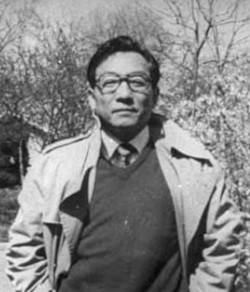
Henry Liu, often known by his pen name Chiang Nan, was a Taiwanese-American writer and journalist. He was a vocal critic of the Kuomintang, then the single ruling party of the Republic of China in Taiwan, and was most famous for writing an unauthorized biography of Chiang Ching-kuo, then president of the Republic of China. He later became a naturalized citizen of the United States, and resided in Daly City, California, where he was assassinated by Bamboo Union members who had been reportedly trained by the Kuomintang's military intelligence division.

Tzi Ma is a Hong Kong-American actor. He has appeared in television shows including The Man in the High Castle and 24, and films including Dante's Peak, Rush Hour, Rush Hour 3, Arrival, The Farewell, Tigertail, and Mulan. From 2021 to 2023, he starred in the American martial arts television series Kung Fu on The CW.
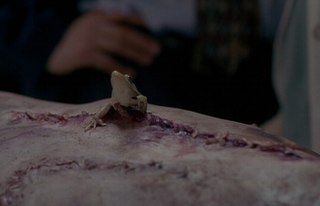
"Hell Money" is the nineteenth episode of the third season of the science fiction television series The X-Files and 68th episode overall. It premiered on the Fox network in the United States on March 29, 1996. It was written by Jeffrey Vlaming and directed by Tucker Gates. The episode is a "Monster-of-the-Week" story, unconnected to the series' wider mythology. "Hell Money" earned a Nielsen household rating of 9.9, being watched by 14.86 million people in its initial broadcast. The episode received mostly mixed to positive reviews from television critics.
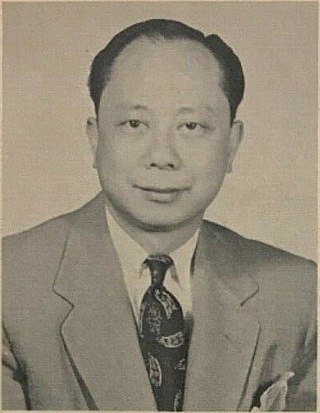
Chin Yang Lee was a Chinese American author best known for his 1957 novel The Flower Drum Song, which inspired the Rodgers and Hammerstein musical Flower Drum Song and the eponymous 1961 film which was nominated for five Academy Awards.
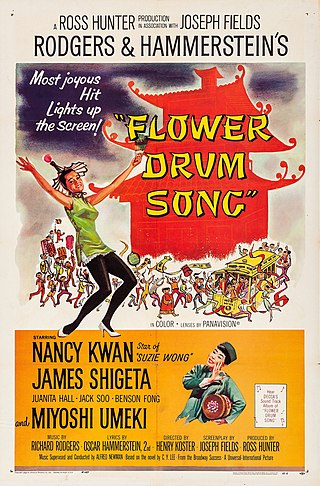
Flower Drum Song is a 1961 American musical film directed by Henry Koster, adapted from the 1958 Broadway musical Flower Drum Song, written by the composer Richard Rodgers and the lyricist/librettist Oscar Hammerstein II, in turn based on the 1957 novel of the same name by the Chinese American author Chin Yang Lee. The film stars Nancy Kwan, James Shigeta, Miyoshi Umeki, Jack Soo, Benson Fong and Juanita Hall. It was nominated for five Academy Awards and two Golden Globe Awards, including Best Motion Picture – Musical or Comedy.
Frederick Vanderbilt Field was an American leftist political activist, political writer and a great-great-grandson of railroad tycoon Cornelius "Commodore" Vanderbilt, disinherited by his wealthy relatives for his radical political views. Field became a specialist on Asia and was a prime staff member and supporter of the Institute of Pacific Relations. He also supported Henry Wallace's Progressive Party and so many openly Communist organizations that he was accused of being a member of the Communist Party. He was a top target of the American government during the peak of 1950s McCarthyism. Field denied ever having been a party member but admitted in his memoirs, "I suppose I was what the Party called a 'member at large.'"
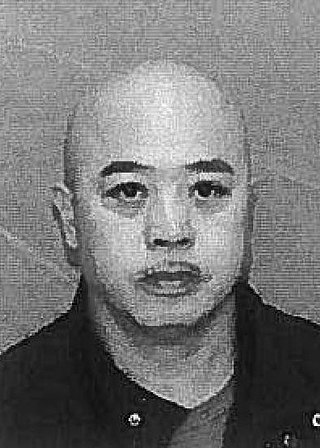
Raymond Kwok-Cheung Chow, nicknamed "Shrimp Boy", is a Hong Kong-born felon with ties to a San Francisco Chinatown street gang and an organized crime syndicate, including the American branch of the Hong Kong-based triad Wo Hop To and the Hop Sing Boys.
The Resistance Conspiracy case (1988–1990) was a federal judicial trial in the United States in which six people were charged with the 1983 U.S. Senate bombing and related bombings of Fort McNair and the Washington Navy Yard: Marilyn Jean Buck, Linda Sue Evans, Susan Rosenberg, Timothy Blunk, Alan Berkman, and Elizabeth Ann Duke.
Kelvin Han Yee is an American actor of Asian descent. His career spans over 30 years of film, television and theater.
The Mind Poisoners is the 18th novel in the long-running Nick Carter-Killmaster series of spy novels. Carter is a US secret agent, code-named N-3, with the rank of Killmaster. He works for AXE – a secret arm of the US intelligence services.
Edmund Jew is an American former politician and businessman, who was convicted of extortion, bribery, and perjury in 2008.

Philip Jacob Jaffe was a left-wing American businessman, editor and author. He was born in Ukraine and moved to New York City as a child. He became the owner of a profitable greeting card company. In the 1930s Jaffe became interested in Communism and edited two journals associated with the Communist Party USA. He is known for the 1945 Amerasia affair, in which the FBI found classified documents in the offices of his Amerasia magazine that had been given to him by State Department employee John S. Service. He received a minimal sentence due to OSS/FBI bungling of the investigation, but there were continued reviews of the affair by Congress into the 1950s. He later wrote about the rise and decline of the Communist Party in the USA.

The Jade Pendant is a 2017 American Western film directed by Leong Po-Chih and starring Godfrey Gao as Tom Wong, Clara Lee as Peony, following a tragic love story leading to the largest mass lynching in American history, of 19 Chinese immigrants in Los Angeles' Chinatown, in 1871.













